非谓语动词讲义
专题12.非谓语动词考点梳理(复习讲义)

专题12.非谓语动词考点梳理(复习讲义)考点清单范围知识条目非谓语动词熟练运用动词不定式作宾语、宾语补足语和目的状语理解动词不定式作主语和定语的用法考点一动词不定式的用法一、动词不定式的构成不定式的基本形式为:to+动词原形,有时可以不用to,这里的to是不定式符号,本身无词义,动词不定式的否定形式是在其前面加not。
二、动词不定式的句法功能功能例句说明主语To speak English is not easy for us.=It is not easy forus to speak English.讲英语对我们来说不容易。
不定式作主语时,常常可用it作形式主语,而把不定式放在后面表语My work is to clean the room every day.我的工作就是每天打扫这间屋子。
多数情况下,不定式作表语表示主语的“职业、职责”等宾语I wish to speak to the manager.我想跟经理说话。
只能作某些动词的宾语,一般不作介词的宾语宾补She asked me not to speak Chinese in class.她让我在课上不要讲汉语。
在make,let,see,hear,watch等使役、感官动词后,不定式省略to定语Have you got anything to say?你有要说的吗?不定式作定语,要放在所修饰词的后面状语I’m sorry to trouble you.(表原因)很抱歉,给你添麻烦了。
I went to the library to study English.(表目的)我去图书馆学英语了。
不定式作状语,其逻辑主语要和句子的主语一致1.不定式作主语动词不定式作主语时,常用it作形式主语,而将真正的主语放在句末,常用结构为:It+be+adj.(+for/of sb.)+动词不定式。
如:To learn English well is useful.→It is useful to learn English well.It’s important for us to protect the environment.注意:在kind,good,nice,clever等表示人的品质的形容词后,不用for而用of。
非谓语动词讲义
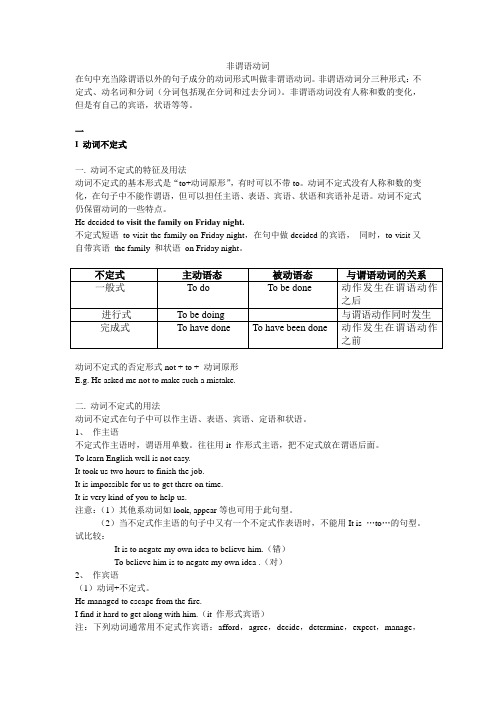
非谓语动词在句中充当除谓语以外的句子成分的动词形式叫做非谓语动词。
非谓语动词分三种形式:不定式、动名词和分词(分词包括现在分词和过去分词)。
非谓语动词没有人称和数的变化,但是有自己的宾语,状语等等。
一I 动词不定式一. 动词不定式的特征及用法动词不定式的基本形式是“to+动词原形”,有时可以不带to。
动词不定式没有人称和数的变化,在句子中不能作谓语,但可以担任主语、表语、宾语、状语和宾语补足语。
动词不定式仍保留动词的一些特点。
He decided to visit the family on Friday night.不定式短语to visit the family on Friday night,在句中做decided的宾语,同时,to visit又自带宾语the family 和状语on Friday night。
动词不定式的否定形式not + to + 动词原形E.g. He asked me not to make such a mistake.二. 动词不定式的用法动词不定式在句子中可以作主语、表语、宾语、定语和状语。
1、作主语不定式作主语时,谓语用单数。
往往用it 作形式主语,把不定式放在谓语后面。
To learn English well is not easy.It took us two hours to finish the job.It is impossible for us to get there on time.It is very kind of you to help us.注意:(1)其他系动词如look, appear等也可用于此句型。
(2)当不定式作主语的句子中又有一个不定式作表语时,不能用It is …to…的句型。
试比较:It is to negate my own idea to believe him.(错)To believe him is to negate my own idea .(对)2、作宾语(1)动词+不定式。
非谓语动词讲义

非谓语动词1.非谓语动词除去不能做谓语之外,其他所有成分都可以做。
[思维导图]2.非谓语动词首先是一种动词形式,其次这种动词形式不能做谓语。
非谓语动词除去不能做谓语之外,其他所有成分都可以做。
3.非谓语动词的逻辑主语一般式句子的主语。
4.(1)若提示词为动词,句中没有别的谓语动词,或者虽然已有谓语动词,但需填的动词与之是并列关系时,就该填谓语动词,此时要考虑时态、语态和主谓一致,有时还需考虑虚拟语气。
(2)若提示词为动词,句中已有谓语动词,又不是并列谓语时,就该填非谓语动词,就要确定是v.-ing形式,v.-ed形式,还是不定式。
一般来说,v.-ing 形式表示主动、进行;v.-ed形式表示被动、完成;不定式表示尚未发生的动作。
命题点一动词不定式不定式由“to+动词原形”构成,其否定形式是“not to+动词原形”。
不定式可以加宾语或状语构成不定式短语,它没有人称和数的变化,但有时态和语态的变化。
(一)不定式的用法1.作主语(1)不定式短语作主语时,往往放在谓语之后,用it作形式主语。
To see is to believe.眼见为实。
It is right to give up smoking.戒烟是正确的。
(2)在“It is/was+adj.+for/of sb. to do sth.”结构中,若形容词侧重于评价人物的特性、特征,则构成不定式复合结构的介词应用of,此时形容词常为kind, nice, foolish等词,且sb.与形容词之间可构成逻辑上的系表关系;若形容词侧重于描写不定式动作的特征、特点,则构成不定式复合结构的介词应用for。
It is generous of him to contribute so much.他捐献了这么多真是太慷慨了。
It was important for us to live a low-carbon life.过一种低碳生活对我们来说很重要。
2.作宾语(1)下列动词只能用不定式作宾语,请牢记下面的口诀:我们一致同意在校门口见面。
2024年中考英语复习之非谓语动词用法讲义

2024届中考英语复习之非谓语动词用法1.不定式、ing分词及动词的过去分词做表语不定式(to+动词原形)作表语时,表示动作还没有发生或还没有实现。
例如,"I am to go to the park."(我打算去公园。
)在这个例子中,不定式"to go to the park"作表语,表示动作还没有发生。
ing分词(现在分词)作表语时,表示正在进行的动作或状态。
例如,"He is singing a song."(他正在唱歌。
)在这个例子中,ing 分词"singing a song"作表语,表示正在进行的动作。
动词的过去分词(past participle)作表语时,表示完成的动作或状态。
例如,"She has finished her homework."(她已经完成了她的家庭作业。
)在这个例子中,过去分词"finished"作表语,表示完成的动作。
需要注意的是,不定式ing分词和动词的过去分词作表语的情况并不常见,而且在实际应用中需要根据具体语境和表达意图进行选择和使用。
2. 不定式、ing分词及动词的过去分词做宾语补足语不定式ing分词及动词的过去分词作宾语补足语的情况。
不定式(to+动词原形)作宾语补足语时,表示动作还没有发生或还没有实现。
例如,"I am to go to the park."(我打算去公园。
)在这个例子中,不定式"to go to the park"作宾语补足语,表示动作还没有发生。
ing分词(现在分词)作宾语补足语时,表示正在进行的动作或状态。
例如,"He is singing a song."(他正在唱歌。
)在这个例子中,ing分词"singing a song"作宾语补足语,表示正在进行的动作。
非谓语动词讲义

非谓语动词1.非谓语动词的三种形式:动词不定式(to + V);动名词(Ving);分词(即:现在分词—ing分词和过去分词—ed分词)1.1 不定式的形式(以do为例)1.2Ving的形式(以do为例)注:--ing分词的形式与之相同1.3过去分词表示“完成和被动”,所以—ed分词没有一般式和完成式之分,和主动态和被动态之分。
1.4 –ing分词和—ed分词的区别–ing分词作定语时和所修饰的名词之间是主动关系或是表示正在进行;—ed分词而则表示被动和完成意义。
2.非谓语动词的应用范围3. 非谓语动词充当主语3.1 inf表示具体的某一次动作;Ving表示泛指。
4.非谓语动词充当宾语4.1 只能接不定式的词语(作宾语):agree, ask, choose, decide, demand, except, hope, learn, manage, offer, plan, promise, pretend,advise, refuse, persuade, count on, long for, wait for等4.2 只能接Ving的词语(作宾语):admit, avoid, consider, enjoy, escape,deny, delay, resist, risk, mind, miss等4.3 跟两种不同形式表达不同意思的一些常见词4.4 省略不定式符号to的情况4.4.1.在情态成语之后(would rather; would sooner; would as soon;would just as soon; can’t help/choose but【不得不…】;had better等)4.4.2“使役动词+宾语”之后(let, make have)4.4.3.“感觉动词+宾语”之后(see , observe, notice, watch, look at;hear, listen to; feel)即“五看两听一感觉”4.4.4.在介词except/but之后它们之前有实意动词“do”的某种形式,其后不带“to”的定式,否则要带“to”的不定式。
非谓语动词用法讲义
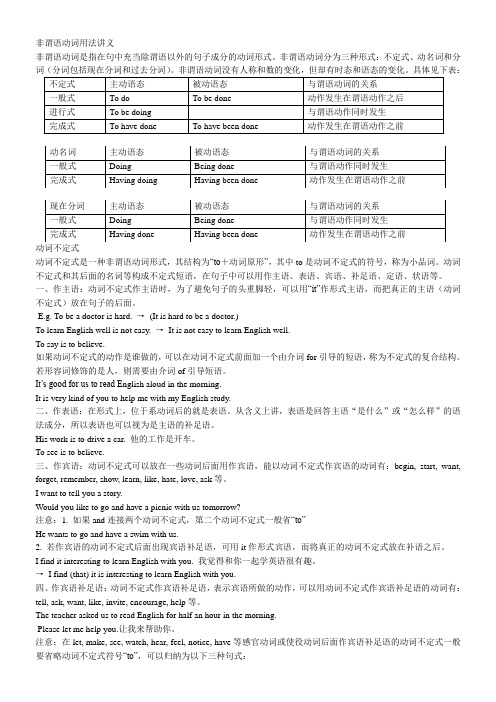
非谓语动词用法讲义非谓语动词是指在句中充当除谓语以外的句子成分的动词形式。
非谓语动词分为三种形式:不定式、动名词和分词(分词包括现在分词和过去分词)。
非谓语动词没有人称和数的变化,但却有时态和语态的变化。
具体见下表:动词不定式动词不定式是一种非谓语动词形式,其结构为“to +动词原形”,其中to 是动词不定式的符号,称为小品词。
动词不定式和其后面的名词等构成不定式短语,在句子中可以用作主语、表语、宾语、补足语、定语、状语等。
一、作主语:动词不定式作主语时,为了避免句子的头重脚轻,可以用“it”作形式主语,而把真正的主语(动词不定式)放在句子的后面。
E.g. To be a doctor is hard. → (It is hard to be a doctor.)To learn English well is not easy. → It is not easy to learn English well. To say is to believe.如果动词不定式的动作是谁做的,可以在动词不定式前面加一个由介词for 引导的短语,称为不定式的复合结构。
若形容词修饰的是人,则需要由介词of 引导短语。
It’s good for us to read E nglish aloud in the morning. It is very kind of you to help me with my English study.二、作表语:在形式上,位于系动词后的就是表语。
从含义上讲,表语是回答主语“是什么”或“怎么样”的语法成分,所以表语也可以视为是主语的补足语。
His work is to drive a car. 他的工作是开车。
To see is to believe.三、作宾语:动词不定式可以放在一些动词后面用作宾语,能以动词不定式作宾语的动词有:begin, start, want, forget, remember, show, learn, like, hate, love, ask 等。
非谓语动词用法讲义(精)

非谓语动词用法讲义第一部分: 非谓语动词用法详解一、不定式的用法1. 不定式的构成不定式是由不定式符号to+动词原形构成,在某些情况下to也可省略。
不定式一般有时式和语态的变化,通常有下表中的几种形式(以do为例):主动式被动式一般式to do to be done完成式to have done to have been done进行式to be doing /完成进行式to have been doing /1) 不定式的一般式不定式的一般式所表示的动作通常与主要谓语的动作同时或几乎同时发生,或是在它之后发生。
如:They invited us to go there this summer. 他们邀请我们今年夏天去那儿。
He stood aside for me to pass. 他站到一边让我通过。
2) 不定式的完成式不定式的完成式所表示的动作在谓语所表示的动作之前发生,它在句中可作表语、状语、宾语,有时也可作主语、定语等。
如:She seemed to have heard about this matter. 她似乎已听说过这件事。
I am sorry to have kept you waiting so long. 我很抱歉让你等了这么久。
I meant to have told you about it, but I happened to have an important thing to do.我本来想告诉你这件事的,但我碰巧有一件重要的事要做。
It has been an honor for me to have traveled so much in your country.对我来说,在你们国家旅行这么多地方是一件很荣幸的事情。
3) 不定式的进行式不定式的进行式表示正在进行的与谓语动词同时发生的动作。
它在句中可以用作除谓语以外的所有成分。
如:It’s nice of you to be helping us these days. 你真好,这些天一直帮我们。
非谓语动词使用讲义

to do(与宾语有动宾关系,表示将要发生的动作)
(1)With_the_children_following_him(由于孩子跟着他), he had to go back to the park.
(2) With the work finished, he could go home.
There be结构中不定式修饰主语时,主动式和被动式皆可。
如果不定式有逻辑主语,只用主动式。
There is nothing for me to do today.
4.只接不定式作宾语的动词:hope,want,offer,long,fail,expect,wish,ask,decide,pretend,manage,agree,afford,determine,promise,happen
To save time is to lengthen life. (不定式短语作主语)
You should continue to learn as long as you live.要活到老学到老。(不定式短语作宾语)
She usually has a lot of meetings to attend in the evenings.她晚上经常有很多会要开。(不定式短语作定语)
三.动词ing:表进行和主动
动名词和现在分词一样也是由动词+ing构成,表示主动和进行,在句中起名词的作用,可作主语、宾语、表语和定语。否定形式也是not+动名词,有四种时态和语态形式,使用时注意如下内容即可。
时态语态
主动
被动
一般
teaching
being taught
完成
having taught
高考英语非谓语动词精品讲义
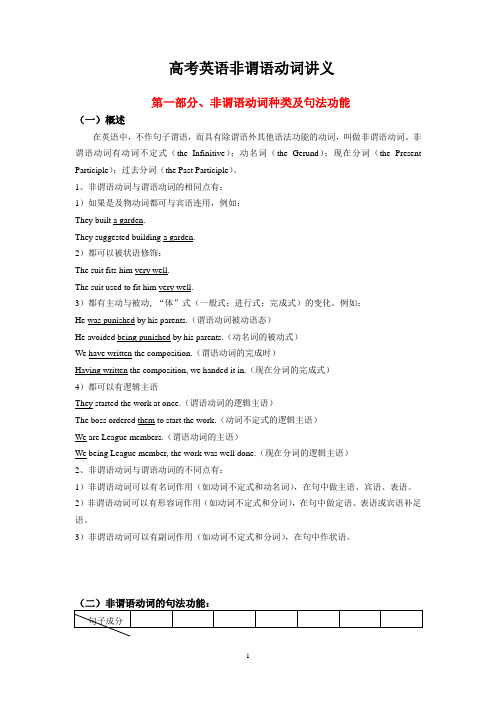
高考英语非谓语动词讲义第一部分、非谓语动词种类及句法功能(一)概述在英语中,不作句子谓语,而具有除谓语外其他语法功能的动词,叫做非谓语动词。
非谓语动词有动词不定式(the Infinitive);动名词(the Gerund);现在分词(the Present Participle);过去分词(the Past Participle)。
1、非谓语动词与谓语动词的相同点有:1)如果是及物动词都可与宾语连用,例如:They built a garden.They suggested building a garden.2)都可以被状语修饰:The suit fits him very well.The suit used to fit him very well.3)都有主动与被动, “体”式(一般式;进行式;完成式)的变化。
例如:He was punished by his parents.(谓语动词被动语态)He avoided being punished by his parents.(动名词的被动式)We have written the composition.(谓语动词的完成时)Having written the composition, we handed it in.(现在分词的完成式)4)都可以有逻辑主语They started the work at once.(谓语动词的逻辑主语)The boss ordered them to start the work.(动词不定式的逻辑主语)We are League members.(谓语动词的主语)We being League member, the work was well done.(现在分词的逻辑主语)2、非谓语动词与谓语动词的不同点有:1)非谓语动词可以有名词作用(如动词不定式和动名词),在句中做主语、宾语、表语。
2)非谓语动词可以有形容词作用(如动词不定式和分词),在句中做定语、表语或宾语补足语。
非谓语动词讲义
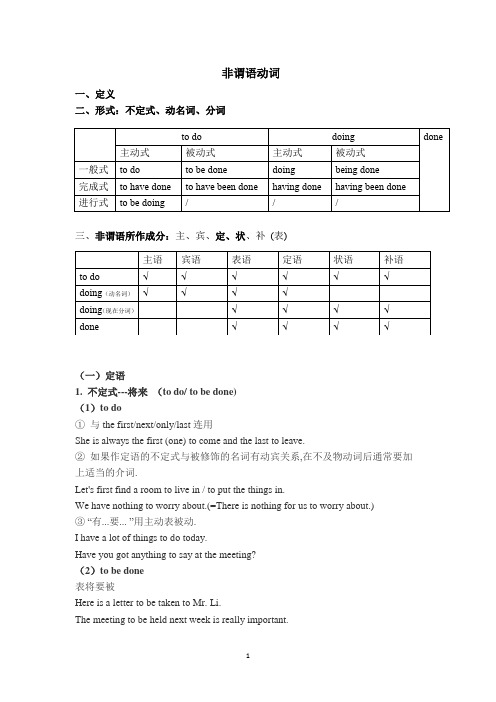
非谓语动词一、定义二、形式:不定式、动名词、分词三、非谓语所作成分:主、宾、定、状、补(表)(一)定语1. 不定式---将来(to do/ to be done)(1)to do①与the first/next/only/last连用She is always the first (one) to come and the last to leave.②如果作定语的不定式与被修饰的名词有动宾关系,在不及物动词后通常要加上适当的介词.Let's first find a room to live in / to put the things in.We have nothing to worry about.(=There is nothing for us to worry about.)③ “有...要... ”用主动表被动.I have a lot of things to do today.Have you got anything to say at the meeting?(2)to be done表将要被Here is a letter to be taken to Mr. Li.The meeting to be held next week is really important.2.分词(1)doing---主动进行Do you know the boy talking ( = who is talking ) to the teacher?Did you notice the boy sitting ( = who was sitting ) at this desk yesterday?The man shaking ( = who is now shaking ) hands with Mr. Li visited our class yesterday.(2)done---被动、完成He is a student loved by all the teachers.The material discovered almost by accident,has greatly changed the world.(3)being done---正在被The building being built will be the third Teaching Building of our school.The meeting being held is really important.辨析:done, being done, to be done(表被动的后置定语)A building ________ (build) last year is our library.A building ________ (build) now is our library.A building ________ (build) next year is our library.小试牛刀1.The Town Hall ______ in the 1800’s was the most excellent building at that time.A. to be completedB. having been completedC. completedD. being completed2. Can those ____ at the back of the classroom hear me?A. satB. sitC. to sitD. sitting3. The trees _____ in the storm have been moved off the road.A. being blown downB. blown downC. blowing downD. to blow down4. The play_____ next month aims mainly to reflect the local culture.A. producedB. being producedC. to be producedD. having been produced5. We are invited to a party _________in our club next Friday.A. to be heldB. heldC. being heldD. holding6. I have a lot of readings _____ before the end of this term.A. completeB. to completeC. completedD. completing(二)状语1.不定式(1)to do作目的状语: in order to do / so as to doHe got up early in order to catch the first bus.To get a good result, she worked very hard.He went to France to learn French.They stood by the roadside to talk about the plan.作结果状语: only to do / have no choice but to do/ can do nothing but do/ too...to/adj.+enough to doHe hurried to the station only to find the train gone.We have no choice but to wait.He wants to do nothing but play computer games.His family was too poor to support him.He is old enough to go to school.作原因状语: 表示引起这种情绪变化的原因。
非谓语动词讲义
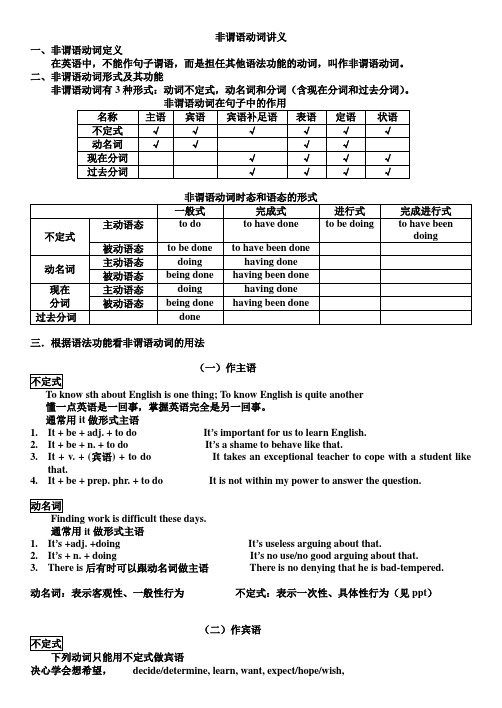
非谓语动词讲义一、非谓语动词定义在英语中,不能作句子谓语,而是担任其他语法功能的动词,叫作非谓语动词。
二、非谓语动词形式及其功能非谓语动词有3种形式:动词不定式,动名词和分词(含现在分词和过去分词)。
三.根据语法功能看非谓语动词的用法(一)作主语懂一点英语是一回事,掌握英语完全是另一回事。
通常用it做形式主语1.It + be + adj. + to do It’s important for us to learn English.2.It + be + n. + to do It’s a shame to behave like that.3.It + v. + (宾语) + to do It takes an exceptional teacher to cope with a student likethat.4.It + be + prep. phr. + to do It is not within my power to answer the question.通常用it做形式主语1.It’s +adj. +doing It’s useless arguing about that.2.It’s + n. + doing It’s no use/no good arguing about that.3.There is后有时可以跟动名词做主语There is no denying that he is bad-tempered.动名词:表示客观性、一般性行为不定式:表示一次性、具体性行为(见ppt)(二)作宾语决心学会想希望,decide/determine, learn, want, expect/hope/wish,拒绝设法愿假装。
refuse, manage, care, pretend主动应答选计划,offer, promise, choose, plan同意请求帮一帮。
agree, ask/ beg, help此外,afford, strive(努力)等也要不定式作宾语。
非谓语动词讲义

非谓语动词一.非谓语动词:动词的某种特殊形式,在句子中做除谓语外的其他成分。
分类:动词不定式,动名词,现在分词,过去分词。
二.动词不定式:构成:to do。
否定形式:not to do .发生。
eg: I plan to live a busy life in high school.She seems to be unhappy.The computer needs to be repaired.完成式:不定式的动作发生在谓语动词的动作之前。
eg: I am sorry to have kept you waiting so long.The house seems to have been broken into.进行式:不定式的动作与谓语动词的动作同时发生。
eg: She pretended to be reading when her mother came in.He happened to be searching my bag when I came in.2.句法功能:(1)做主语:To see is to believe. 眼见为实/百闻不如一见。
It is adj for/of sb to do sth. 对某人来说,做某事是It is impossible for me to live alone in Beijing.It is not easy to find your way around the town.(2)做宾语:afford, agree, aim, bear, begin, bother, care, choose, continue, decide, demand, desire, determine, expect, fail, forget, hate, help, hope, intend, learn, manage, mean, need, offer, plan, pretend, refuse, remember, want, wish, promise, happeneg: She has determined to be a leader.注: 如果不定式做宾语,且后面有宾补时,把不定式后置,用it来做形式宾语。
非谓语动词语法讲义高考英语一轮复习
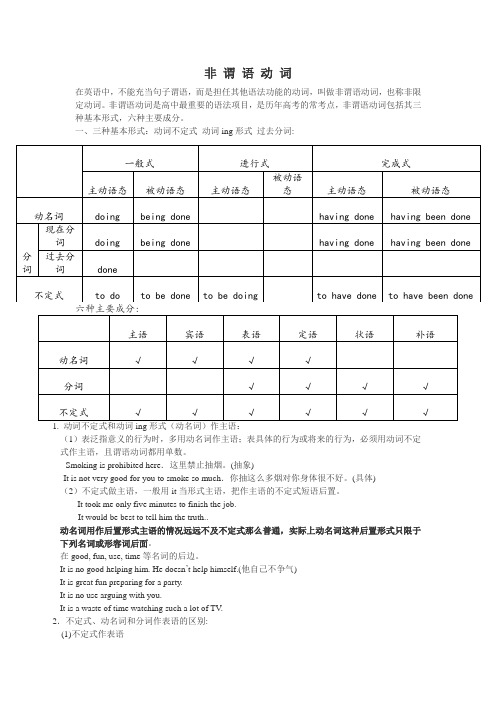
非谓语动词在英语中,不能充当句子谓语,而是担任其他语法功能的动词,叫做非谓语动词,也称非限定动词。
非谓语动词是高中最重要的语法项目,是历年高考的常考点,非谓语动词包括其三种基本形式,六种主要成分。
一、三种基本形式:动词不定式动词ing形式过去分词:(1)表泛指意义的行为时,多用动名词作主语;表具体的行为或将来的行为,必须用动词不定式作主语,且谓语动词都用单数。
Smoking is prohibited here.这里禁止抽烟。
(抽象)It is not very good for you to smoke so much.你抽这么多烟对你身体很不好。
(具体)(2)不定式做主语,一般用it当形式主语,把作主语的不定式短语后置。
It took me only five minutes to finish the job.It would be best to tell him the truth..动名词用作后置形式主语的情况远远不及不定式那么普通,实际上动名词这种后置形式只限于下列名词或形容词后面。
在good, fun, use, time等名词的后边。
It is no good helping him. He doesn’t help himself.(他自己不争气)It is great fun preparing for a party.It is no use arguing with you.It is a waste of time watching such a lot of TV.2.不定式、动名词和分词作表语的区别:(1)不定式作表语1)不定式作表语一般表示具体动作,特别是表示将来的动作。
To do two things at a time is to do neither.次做两件事等于未做。
What I would suggest is to start work at once.我的建议是立刻开始干。
非谓语(讲义)-人教PEP版英语六年级下册
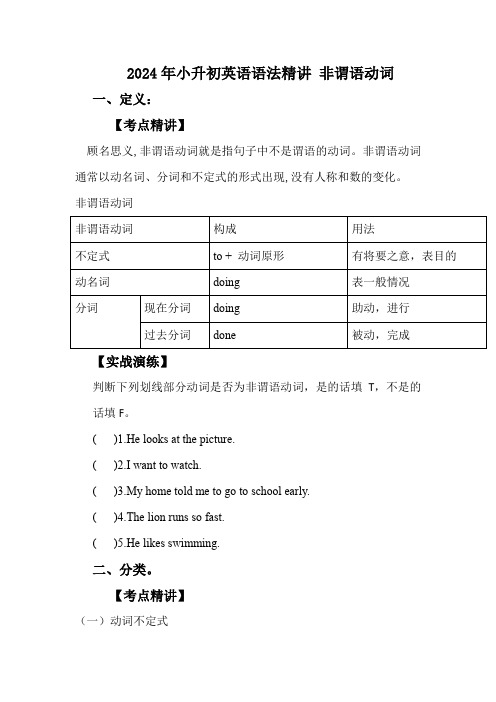
2024年小升初英语语法精讲非谓语动词一、定义:【考点精讲】顾名思义,非谓语动词就是指句子中不是谓语的动词。
非谓语动词通常以动名词、分词和不定式的形式出现,没有人称和数的变化。
非谓语动词【实战演练】判断下列划线部分动词是否为非谓语动词,是的话填T,不是的话填F。
( )1.He looks at the picture.( )2.I want to watch.( )3.My home told me to go to school early.( )4.The lion runs so fast.( )5.He likes swimming.二、分类。
【考点精讲】(一)动词不定式1.动词不定式的构成不定式的基本形式为to+动词原形,有时也可以不用to,这里的to是不定式符号,本身无词义。
动词不定式的否定形式是not+to+动词原形。
例:My father asked me not to read in bed.爸爸叫我不要在床上看书。
My teacher made me recite the text in class.老师让我在课堂上背课文。
2.常见的后跟不定式的动词绝大部分动词后面跟不定式,如:agree,ask,hope. decide,want,tell, would like等。
有部分动词后跟不定式要省略to,直接跟动词原形,如:let,make,have,help等。
例: He agreed to join us. 他答应加入我们。
My mother asks me to go to school on time. 妈妈叫我按时上学。
【实战演练】用所给词的适当形式填空。
1. I hope (find) a good job in a foreign pany after I graduate from school.2. He found it hard (catch up with) his classmates.3. Father asks me (not play) puter games before finishing my homework.4. All the children like Mr White very much because he often makes them(laugh).5. Let him (have)a rest. I think he must be tired after the long walk.【考点精讲】(二)动名词1.动名词的构成:动名词一般由“动词原形+ing”构成。
- 1、下载文档前请自行甄别文档内容的完整性,平台不提供额外的编辑、内容补充、找答案等附加服务。
- 2、"仅部分预览"的文档,不可在线预览部分如存在完整性等问题,可反馈申请退款(可完整预览的文档不适用该条件!)。
- 3、如文档侵犯您的权益,请联系客服反馈,我们会尽快为您处理(人工客服工作时间:9:00-18:30)。
非谓语动词非谓语动词是指在句子中不是谓语的动词:A: 是动词的特殊形式,有时态、语态的变化;功能可分为1、2、3;B: 不受制于主语,没有人称和数的变化C:种类否定式:not + 动名词逻辑主语:物主代词(有时用宾格代词)、名词所有格(有时用名词普通格)Eg. 1 .He forgot having been taken to Guangzhou when he was five years old(宾语、完成式)2. His not being praised upset him a lot.(主语、被动式)3. In the ant city, the queen’s job is laying eggs. (表语)4.He can’t walk without a walking-stick(定语)5.The cave, his hiding-place is secret (同位语)动名词的习惯用法(1)要记住如下动词及短语只跟动名词作宾语:enjoy, finish, suggest, avoid(避免), excuse ,delay, imagine, keep, miss, consider, admit(承认),deny(否认), mind, permit, forbid, practise, risk(冒险), appreciate(感激), be busy, bem, pa yerful②③(4The problem is in need of working out. The question is well worth discussing动词不定式动词不定式:(to)+do,具有名词、形容词、副词的特征。
否定式:not /never + (to) do逻辑主语:of\for sb+to do sth以do为例,动词不定式的构成如下:.I have no choice but to stay here.He did nothing last Sunday but repair his bike.有些动词常用代疑问词的不定式作宾语,例如:teach, remember, advise, show, know, forget, learn, understand, see, hear, find out, explain, decide, discuss等,如:He gave us some advice on how to learn English.They haven’t decided when to leave so far.(4)作宾语补足语:在复合宾语中,动词不定式可充当宾语补足语,补充说明作宾语的名词或代词的动作或状态,如下动词常跟这种复合宾语:want, wish, ask, tell, order, beg, permit, help, advise, persuade, allow, prepare, cause, force, call on, wait for, invite, invite, warn, expect, prefer, encourage等Their parents prefer them to be home early.My parents don’t allow me to go out at night.(5)作定语:动词不定式作定语,放在所修饰的名词或代词后。
与所修饰名词有如下关系:1.动宾关系:I have a meeting to attend.注意:不定式为不及物动词时,所修饰的名词如果是地点、工具等,应有必要的介词,如:He found a good house to live in. The child has nothing to worry about.What did you open it with?如果不定式修饰time, place, way,可以省略介词:He has no place to live. This is the best way to work out this problem.如果不定式所修饰名词是不定式动作承受者,不定式可用主动式也可用被动式:Have you got anything to send? 你要送什么东西吗?(你自己去送)Have you got anything to be sent? 你有什么东西需要送吗?(别人替你送)2.被修饰名词是不定式逻辑主语:He is the first to get here.6)作状语:①表目的,常译成为了,不定式一般放在被修饰词之后,但为了强调目的也可放在句首。
为了加强语气,还可用in order to 或so as to.We should do whatever we can to help them.We took an umbrella so as not to get wet.注意不定式放句首时,逻辑主语与句子主语要一致:wrong:To save money, every means has been tried.right:To save money, he has tried every means.wrong:To learn English well, a dictionary is needed.right:To learn English well, he needs a dictionary.②表结果(往往是与预期愿望相反的结果):only to do sthHe arrived late only to find the train had gone.I visited him only to find him out.③表原因:They were very sad to hear the news.④表程度:It’s too dark for us to see anything.The question is simple for him to answer.(7)作独立成分:To tell you the truth, I don’t like the way he talked.不定式省略to的几种情况:(1)在cannot but, cannot choose but 与cannot help but 之后的不定式一般都不带to, 常翻译为“不得不”。
例如:I can’t but admire her courage. 我不能不钦佩她的勇气。
He can’t choose but do it. 他只好做这件事了。
I can’t help but love her. 我不禁爱上了她。
(2)在连词but之前如有动词do, 其后的不定式不用to, 即:do nothing but+动词原形,译为“只……”;但如果连词but之前的动词不是do,其后的不定式一般要带to,例如:He does nothing but complain.The workers do nothing but drink tea and talk to each other.He had no choice but to accept the fact.(3) 有些动词如make, let, have等使役动词后用作宾语补足语的不定式必须省略to 如:He had his son clean the car.Rain makes plants grow.当使役动词用于被动语态时,要补上在主动语态中省略的to (主要指make),He was made to work long hours.(4)在see, hear, observe, notice, feel, watch 等感官动词后用作宾语补足语的不定式必须省略to.She noticed the man look at her a couple of times.I felt something crawl up my arm.注:若这些动词用于被动语态或不定式用于完成式,其后的不定式要带to,如:I noticed her to have come early.He was seen to enter the building.注:若动词feel后用作宾语补足语的不定式为to be, 则要带to, 如They felt the plan to be unwise.(5)在动词help后用作宾语或宾语补足语的不定式可以不带to,I helped him (to) repair his bike.当help用于被动语态时,不定式前的to不能省。
The boy was helped by a woman to collect his scattered coins.(6)不定式的并列:第二个不定式可省略to。
He wished to study medicine and become a doctor.(7)不定式的省略:保留to省略do动词。
If you don’t want to do it, you don’t need to.不定式用主动表示被动的几种常见情形(1)不定式to blame, to let用作表语时,通常要用主动表被动。
如:The house is to let. 此屋出租。
Mr Green stood up in defence of the 16-year-old boy, saying thathe was not the one to blame(2)某些”be+adj+to do”结构中的不定式通常要用主动形式表示被动意义。
如:The book is difficult to understand.The work is impossible to finish in a week.注:这类结构的特点是句子主语就是其后不定式的逻辑宾语,按理说其中的不定式要用被动形式,但习惯上却要用主动表被动。
这类形容词常见的有awkward, convenient, dangerous, difficult, easy, hard, impossible, interesting, nice, pleasant, safe, tough, tricky, unpleasant 等。
(3)在too…to do sth和…enough to do sth这两个结构中,若句子主语与其后的不定式to do sth为被动关系,则该不定式通常用主动形式表示被动意义(但有时也可直接用被动式)。
如:The writing is too faint to read (to be read). 这笔迹太模糊,看不清。
